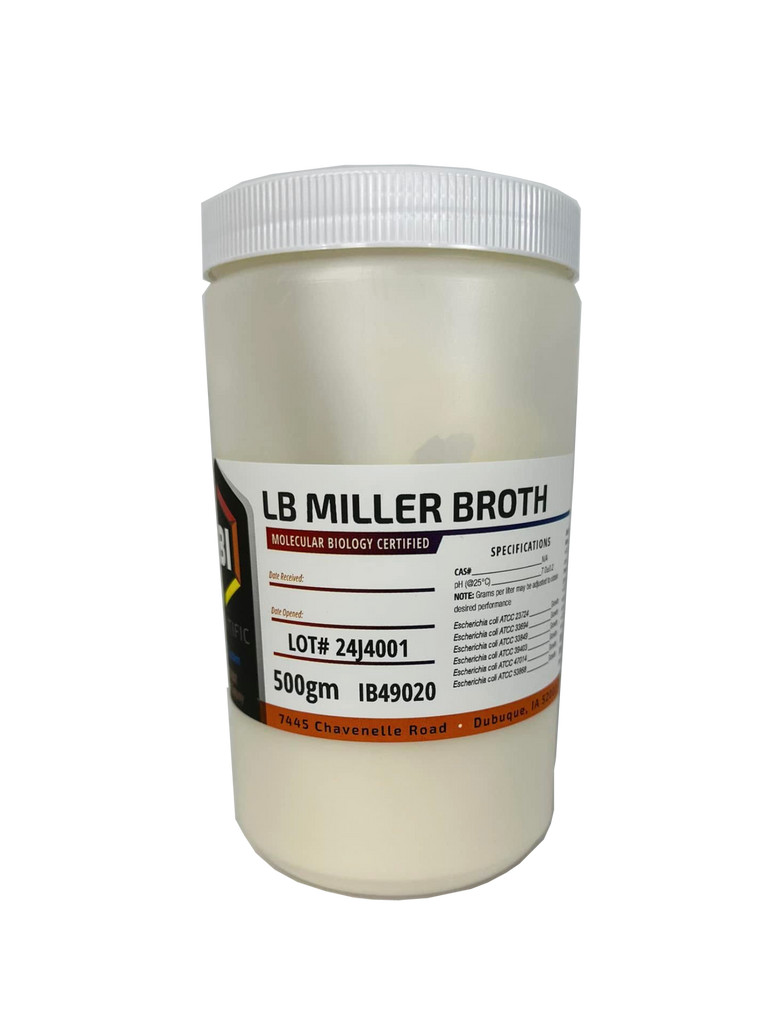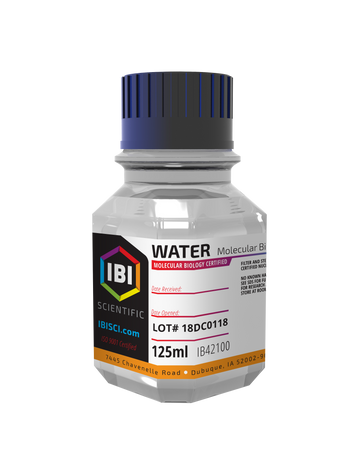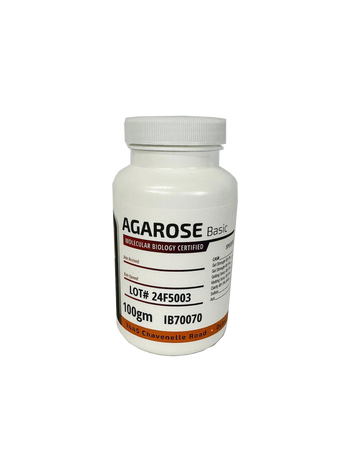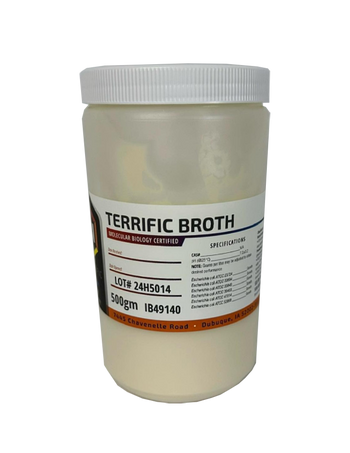
Enhance Bacterial Growth with IBI’s LB Broth
IBI’s Luria Broth (LB Miller Broth) is a high-quality, nutrient-rich medium designed for the cultivation and maintenance of Escherichia coli (E. coli) and other bacteria in molecular and microbiology research. This widely used LB Broth formulation provides the essential nutrients required for bacterial propagation, making it a cornerstone of genetic studies, protein expression, and recombinant DNA research.
With a carefully balanced composition, IBI’s LB Broth ensures optimal bacterial growth by supplying key nutrients, including nitrogen, sulfur, minerals, and vitamins. The combination of casein peptone and yeast extract delivers essential amino acids and peptides, while sodium chloride maintains osmotic balance, ensuring a stable environment for bacterial culture. Whether used in academic research, pharmaceutical development, or industrial microbiology, IBI’s LB Broth guarantees consistent, high-quality results.
The Role of LB Broth in Bacterial Cultivation
LB Broth is the most widely used nutrient medium for bacterial culture due to its ability to support robust microbial growth. It provides an ideal environment for E. coli, allowing for efficient plasmid propagation, protein expression, and genetic transformation. The rich composition of LB Broth facilitates optimal bacterial metabolism, ensuring strong colony formation and high-density culture yields.
For molecular biologists, LB Broth is a preferred medium for cloning and recombinant protein production. It allows bacteria to reach the logarithmic growth phase rapidly, ensuring high plasmid copy numbers and efficient gene expression. The simplicity and efficiency of LB Broth make it indispensable for researchers working in genetic engineering, synthetic biology, and diagnostic microbiology.
How to Prepare LB Broth
The preparation of LB Miller Broth is straightforward and ensures reliable bacterial growth. To prepare 1 liter of LB Broth, mix 25 grams of the powdered medium with 1 liter of purified water until evenly dispersed. Heat the solution with continuous stirring and boil for one minute until fully dissolved. Once dissolved, distribute the broth into culture flasks or test tubes and autoclave at 121.0°C for 15 minutes to sterilize. After autoclaving, store the medium at room temperature in a tightly sealed container, protecting it from moisture and light to maintain its stability and performance.
Why Choose IBI’s LB Broth?
IBI’s LB Broth stands out due to its premium-grade ingredients and rigorous quality control, ensuring optimal bacterial growth and reliable experimental results. Unlike inferior media, our LB Broth is formulated with high-purity casein peptone, yeast extract, and sodium chloride to maintain superior consistency in microbiological studies. Its broad applications range from routine bacterial culture maintenance to high-efficiency protein production and recombinant DNA research.
Researchers and microbiologists trust IBI’s LB Broth for its outstanding performance in molecular cloning, transformation protocols, and cell culture propagation. The robust formulation of LB Broth supports both small-scale and large-scale bacterial culture applications, making it a preferred choice for academic institutions, biotech companies, and research laboratories.
Applications of LB Broth
LB Broth is used extensively in microbiology and molecular biology research. It is a staple medium for bacterial transformation, where competent cells uptake foreign DNA, facilitating genetic modification and recombinant technology. Additionally, LB Broth is essential in protein expression systems, allowing bacteria to synthesize recombinant proteins efficiently.
This nutrient-rich medium is also widely employed in antibiotic selection assays, where researchers incorporate antibiotics like ampicillin, kanamycin, or tetracycline to select for transformed bacterial colonies. Due to its versatility, LB Broth is an essential component in biotechnology, pharmaceutical research, and bioengineering.
Frequently Asked Questions (FAQs)
What does LB stand for in broth?
LB stands for "Luria Broth," named after Salvador Luria, one of the pioneers in bacterial genetics. It is sometimes referred to as "Lysogeny Broth," highlighting its role in supporting bacterial growth in genetic research.
What does LB do in bacteria?
LB Broth provides the essential nutrients bacteria need for growth and metabolism. It supplies nitrogen, vitamins, minerals, and salts that enable bacteria to thrive and reach high cell densities. This makes it ideal for applications such as plasmid propagation and protein expression.
What is LB Broth used for?
LB Broth is used for maintaining and propagating E. coli and other bacterial cultures. It is widely employed in molecular biology for cloning, transformation, and recombinant protein production. Additionally, it is used in microbiological assays, antibiotic resistance testing, and bacterial fermentation studies.
What is the difference between LB Miller and Lennox Broth?
The primary difference between LB Miller and LB Lennox Broth is the concentration of sodium chloride. LB Miller contains 10 g/L of sodium chloride, whereas LB Lennox contains only 5 g/L. This variation in salt concentration affects the osmotic conditions of bacterial cultures, making LB Miller more suitable for general bacterial growth and antibiotic selection experiments.
Order IBI’s LB Broth Today
For reliable and high-quality bacterial culture media, trust IBI’s LB Broth for your research needs. With its superior formulation, rigorous quality control, and unmatched performance, our LB Broth is the perfect choice for molecular biology, microbiology, and genetic engineering applications. Order today and ensure consistent bacterial growth for your scientific experiments.
- Physical Specifications
- LB Broth FAQs
- Certificate of Analysis
- SDS
- Technical Information
Physical Specifications:
CAS#:N/A
pH (@ 25°C):7.0 ± 0.2
NOTE: Grams per liter may be adjusted to obtain desired performance.
Molecular Biology Specifications:
Escherichia coli ATCC 23724: Growth
Escherichia coli ATCC 33694: Growth
Escherichia coli ATCC 33849: Growth
Escherichia coli ATCC 39403: Growth
Escherichia coli ATCC 47014: Growth
Escherichia coli ATCC 53868: Growth
What Does LB Stand for in Broth?
LB stands for Luria-Bertani, named after its creators, Giuseppe Bertani and Salvador Luria. It is a nutritionally rich medium widely used for the growth of bacteria, particularly Escherichia coli (E. coli), in microbiology and molecular biology laboratories.
What is the Purpose of the LB Broth in the Tubes?
The purpose of LB broth in tubes is to provide a nutrient-rich environment for the growth and maintenance of bacterial cultures. The broth contains all the essential nutrients, such as peptides, amino acids, vitamins, and minerals, that bacteria need to grow and thrive. LB broth in tubes is often used for:
- Culturing Bacteria: Growing bacterial cultures for various experiments and analyses.
- Maintaining Stocks: Preserving bacterial strains for future use.
- Plasmid Amplification: Supporting the growth of bacteria carrying plasmids for genetic studies.
Why is LB Broth Good for E. coli?
LB broth is particularly good for E. coli due to its nutrient composition, which supports rapid growth and high cell density. Key reasons include:
- Nutrient-Rich: LB broth provides a balanced mixture of nutrients, including peptone, yeast extract, and sodium chloride, which are essential for the growth and metabolism of E. coli.
- Optimal pH: The pH of LB broth is well-suited for E. coli, ensuring an ideal environment for its proliferation.
- Versatility: LB broth can be used for a variety of applications, from cloning and protein expression to routine culturing.
Is LB Broth the Same as Nutrient Broth?
LB broth and nutrient broth are both used for culturing bacteria, but they have different compositions and applications:
LB Broth:
- Composition: Contains tryptone, yeast extract, and sodium chloride.
- Use: Primarily used for the growth of E. coli and other enteric bacteria in molecular biology.
Nutrient Broth:
- Composition: Contains beef extract, peptone, and sometimes sodium chloride.
- Use: Used for the general cultivation of a wide range of non-fastidious organisms.
While both broths support bacterial growth, LB broth is specifically optimized for molecular biology applications, particularly those involving E. coli.
Benefits of Using LB Broth
- Rapid Growth: Supports fast and robust growth of E. coli and other enteric bacteria.
- Versatile Applications: Suitable for a wide range of microbiological and molecular biology experiments.
- Consistency: Provides a reliable and consistent environment for reproducible results.
Incorporating LB broth into your laboratory protocols ensures optimal growth conditions for your bacterial cultures, making it an essential tool in microbiology and molecular biology research.
Certificate of Analysis Link:
LB Miller Broth CofA - Lot#19A3011
LB Miller Broth CofA-_Lot#19F2002
LB Miller Broth CofA- Lot#19G5001
LB Miller Broth CofA- Lot#19H5004
LB Miller Broth CofA- Lot#19I5001
LB Miller Broth CofA- Lot#20A2002
LB Miller Broth CofA_-_Lot#20E3013
LB Miller Broth CofA_-_Lot#20F1005
LB Miller Broth CofA -_Lot#20H1003
LB Miller Broth CofA -_Lot#20H4015
LB Miller Broth CofA_-_Lot#21C2002
LB Miller Broth CofA_-_Lot#21G2004
LB Miller Broth CofA - Lot#21J2003
LB Miller Broth CofA -Lot#22K3003
LB Miller Broth CofA - Lot#23B2001
LB Miller Broth CofA - Lot#23E2014
LB Miller Broth CofA - Lot#23H3023
LB Miller Broth CofA - Lot#23L3001
LB Miller Broth CofA - Lot#24A4012
LB Miller Broth CofA - Lot#23M2003
LB Miller Broth CofA - Lot#24C2001
LB Miller Broth CofA - Lot#24C3004
LB Miller Broth CofA - Lot#24F1002
SDS Link:
Formula per Liter:
● Casein Digest Peptone 10.0 gm
● Sodium Chloride 10.0 gm
● Yeast Extract 5.0 gm
Preparation:
● Mix 25 gm of the medium in 1 L of purified water until evenly dispersed.
● Heat with repeated stirring, and boil for one minute to dissolve completely.
● Distribute and autoclave at 121.0°C for 15 minutes.
Recommended Use:
IBI’s Luria Broth (LB Miller) is used in molecular genetic studies, as well as maintaining and propagating E.coli in molecular and microbiology procedures. The inclusion of casein peptone and yeast extract supply essential growth factors; such as nitrogen, sulfur, minerals, and vitamins. Sodium chloride provides essential electrolytes.
Storage:
Store at room temperature. Keep tightly sealed. Protect from moisture and light.
Warning:
Irritant. Irritating to the eyes, respiratory system, and skin. Wear suitable protective clothing, gloves, and eye/face protection. See Material Safety Data Sheet for additional information.













